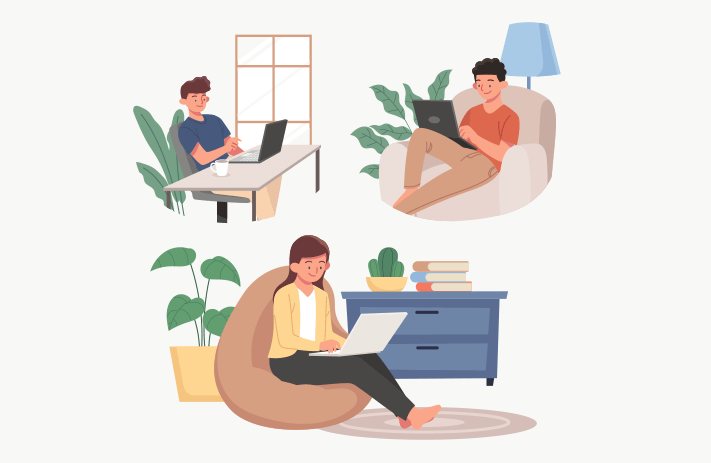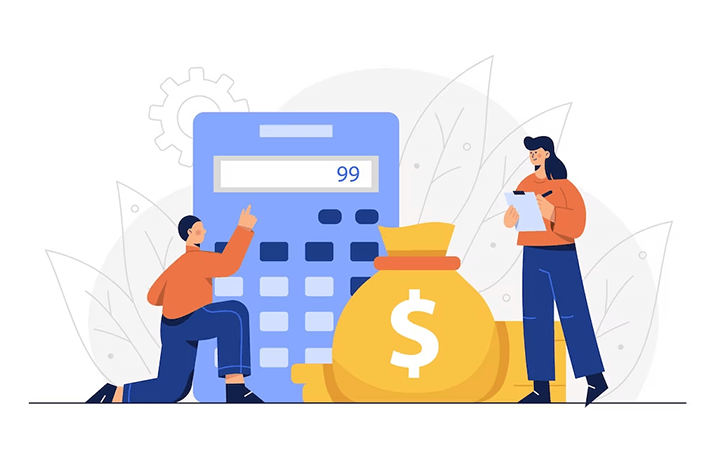
Click the button to start reading
How to Separate Work from Your Personal Life: 13 Tips for Remote Workers
If you work from home, you already know how challenging it can be to keep work separate from your personal life. After all, long gone are the days where you got off work at 5:00, commuted home, and rummaged through the fridge for dinner–the stresses of your job nothing more than a distant memory.
Instead, your home is your office now, which blurs the boundaries between your personal and professional life. As a result, your work responsibilities may feel like they’re constantly beckoning–leaving you stressed, frustrated, and burnt out.
So, how do you create clear boundaries between your work life and home life? Keep reading, because in this article we’re going to provide you with 13 strategies, as well as discuss why it’s so important that you heed our advice and actually follow them. (Hint: your mental health depends on it!).
So let’s kick things off by looking at some compelling reasons why you should keep work separate from your personal life …

The Benefits of Keeping Your Work and Personal Life Separate
There are lots of great reasons to keep your personal life separate from your professional one, like:
1. Less Stress
When there’s little separation between work and your personal life, it can feel like you’re always working–even on nights, weekends, and holidays. As a result, you never get the chance to fully recharge your batteries, which can leave you feeling cranky and out-of-sorts.
Work-life balance alleviates that tension by giving you a break from work demands, so you can just relax and enjoy time spent engaging in fulfilling activities, like hanging out with friends, participating in a favorite hobby, or even just taking a nap!
Even better, because you’ve prioritized your personal needs, you feel less anxious and subsequently, better equipped to tackle professional challenges during your normal work hours.
2. Greater Job Fulfillment
It’s all too easy to start hating your job when work constantly intrudes on your personal time. And nobody wants to spend 40 hours (or more) each week doing something they can’t stand.
Fortunately, the solution is an obvious one: greater work-life balance. Work-life balance helps you stay motivated, engaged, and committed–which is exactly how you want to feel about something you spend more than one-third of your waking hours doing!
3. Happier Outlook
Happiness is important for your mental wellbeing, but it does so much more than just give you a positive outlook. For instance, happiness is also linked to greater creativity, stronger relationships, higher earnings, and better physical health.
And interestingly enough, do you know what one of the strongest predictors of happiness is?According to Harvard Business Review, it’s work-life balance … which is just one more reason it’s well worth it to establish better boundaries between work and your personal life.
4. Greater Productivity
If you’re like most people, you probably believe that the more time spent working, the more productive you are. Sorry to burst your bubble but actually, there’s a large body of research that says otherwise. In fact, some experts suggest that 35 hours is the optimal work week–anything after that, and productivity starts to decline.
While it sounds counterintuitive, scientists suspect that people who are overworked may be less efficient, because they’re stressed out and fatigued. Alternatively, they might be getting more work accomplished in the morning, but as the day drags on, their focus starts to deteriorate. As a result, they make more mistakes, and their productivity slows because they’re forced to do rework.
In either event, this just reinforces why work-life balance is so important. When you make time for your personal life, you return to work with more energy, better focus, and greater efficiency. As a result, you can get more work done in less time, which isn’t just great for you, it’s also good for your employer.
5. Better Physical Health
Unfortunately, a work-life imbalance creates stress–and stress has been shown to weaken your immune system, aggravate medical conditions, and increase your risk of substance abuse. Furthermore, if you’re like most people who don’t have good work-life balance, you probably aren’t getting enough sleep.
Although that might not seem like such a big deal if one of your go-to lines is, “I’ll sleep when I’m dead,” chronic sleep deprivation is actually quite serious. For instance, sleep deprivation has been linked to a whole host of negative health outcomes, including high blood pressure, diabetes, heart disease, obesity, depression, and premature aging.

13 Strategies for Keeping Work Separate from Your Personal Life
1. Use Technology Wisely
Technology is awesome … unless you’re trying to establish better work-life balance.
Then, our tech toys make it all too easy to blur the personal and the professional.
After all, fifty years ago you wouldn’t have been able to read work emails late at night, get texted round-the-clock by coworkers, or even listen to voicemails over the weekend.
By contrast, today’s technology has stripped away the distinction between work and play. As a result, it can seem like you’re working all the time–which is not only depressing, but it’s also incredibly stressful.
That’s why to attain work-life balance, you’ll want to minimize technology distractions when your workday comes to an end by shutting down your email, closing work communication channels, and muting non-essential text alerts.
Likewise, while you’re in the middle of your workday, keep your personal email shut and your phone on silent, so friends and family don’t distract you while you’re working. Although these interruptions may seem like no big deal, they come at a cost by forcing you to work longer into the evening to play catchup–blurring the distinction between your personal and professional life even more.
2. Establish Boundaries
Another way to create better work-life balance is to establish boundaries, both personal and professional. Boundaries are helpful because they reinforce the “work-life separation” mindset you’re trying to establish.
So to set boundaries, you might start by letting your friends and family know that you won’t be responding to calls, texts, or emails during your work hours.
You’ll also want to set your colleagues straight by telling them upfront what they can expect when they contact you. For example, you might explain that you only respond to voicemails during working hours unless it’s an emergency.
Now remember that once you’ve established these boundaries, it’s important to stick to them–otherwise, they won’t have much of an impact. So, if a coworker calls you on the weekend for a routine topic, do exactly what you said you would and wait until Monday to respond.
3. Create a Physical Workspace
A physical workspace creates a mental cue i.e. when I’m sitting in this location, I work; when I’m away from this workspace, I don’t. That’s why designating a home workspace will make it easier for you to keep work separate from the rest of your life.
While creating a home workspace is a bit of a challenge if you have a small apartment, there are tons of creative design solutions at your disposal, such as repurposing an end table or using a bookcase with a built-in desk. Alternatively, you could try our next tip …

4. Work Outside Your Home
Keeping work separate from your home life is even more challenging when you have to deal with roommates, kids, or other family members. If that scenario sounds all too familiar, you might want to consider working outside your home. Not only will doing so help you keep distractions at bay, but it can also replicate the feel of going to an office.
To take advantage of this tip, grab your earbuds and head to a local coffee shop, library, public park, mall, bookstore, or coworking space. Alternatively, you could even see if a friend would be willing to let you work at their place. However, keep in mind that working at someone else’s home might be even more distracting, so use your best judgment when you’re shopping around for a good work spot.
5. Meditate
What does meditation have to do with work-life balance? More than you might think. Consider this … when you struggle to keep work separate from your personal life, your feelings of stress, anxiety, and despair can skyrocket–which is why meditation is so important.
Meditation has been shown to actually physically change your brain in ways that help prevent worrying, anxiety, and depression–while improving concentration.
As a result, meditation helps us stay focused on what we’re doing in the moment, rather than ruminating about work during our off-hours.
6. Set Regular Working Hours
Flexible hours are an increasingly common work perk. And at first glance, they can seem like a gift from the heavens, as you become accustomed to having way more freedom than you’re used to.
However, this flexibility is also one of flex hours’ biggest drawbacks, because without a set schedule, your workday can stretch on … and on and on.
For instance, if you frequently stop and start work to take personal calls, run errands, or check your Tinder, that time has to be made up somehow. As a result, you may find yourself working evenings and weekends–which definitely can leave you feeling unbalanced.
If this sounds really familiar, consider setting regular work hours–then stick to them. By beginning and ending work at the same time every day, you’ll find it easier to keep work separate from your personal life.

7. Keep Separate Email Accounts
Nothing snaps you back faster into work mode than opening your personal email and finding a new message from a client, boss, or coworker–which is why you’ll definitely want to have two separate email accounts, one for work and one for your personal business.
Doing this makes it easier to limit work communications to your working hours, so your job doesn’t encroach on your personal time. However, keep in mind this tactic is only successful if you follow our next tip …
8. Unplug
As we mentioned earlier, it’s a good idea to turn off work-related notifications at the end of each workday. However, that advice will only get you so far. It won’t work, for instance, if you’re constantly turning to your phone, email inbox, or communications platform to see if anyone from work got in touch with you.
So, relax and unplug, rather than continuously checking throughout the day to see what’s going on at work. While this will require some discipline, it’s absolutely worth it if you’re struggling to maintain work-life balance.
9. Develop an AM/PM Routine
Another way you can separate work from your personal life is by developing a morning and evening routine. A lot of people find AM/PM rituals helpful, because they clearly establish when your workday begins … and when it ends.
For instance, although it may be tempting to roll over in bed, grab your laptop, and begin working while you lounge around in your pajamas, that behavior blurs the boundaries between the personal and the professional.
Instead, you might develop a morning routine of fixing a cup of coffee, exercising, jumping into the shower, and then starting your workday–just like you would if you were heading to a physical office.
Likewise, when your workday comes to a close, shut your laptop, step away from your desk, and do something you enjoy to decompress, like reading a book, spending time in nature, or playing a game.
10. Cut Down on Meetings
If you spend most of your day in meetings, you’re probably forced to work evenings and weekends, so you can get your “real work” done–which is why one solution to better work-life balance is to stop attending unnecessary meetings.
Which meetings can be considered unnecessary? Generally speaking, you probably want to bow out of any meetings that don’t require your presence or that lack a clear agenda.
To make doing so easier, try talking to your coworkers about what you can do as a team to reduce the number of meetings your company holds. For instance, you might suggest a “no meetings” day, limiting meetings to certain times, or using a tool like Teamly to exchange information instead.
Since meetings tend to be universally despised and your coworkers may also be struggling with work-life balance, they’ll probably greet your suggestions with great enthusiasm.
11. Take Time Off
Once upon a time, you’d get sick and take the day off from work, rather than spread germs among your coworkers. However, now that working from home has become the new norm, it’s all too common to work through an illness, since you can’t infect your colleagues from your couch.
However, this is a recipe for stress, resentment, and burnout–which makes you feel even more imbalanced. So, rather than sneezing, sniffling, and coughing your way through work, take good care of yourself by enjoying a much-needed sick day when you’re not feeling well.

12. Exercise
At first glance, the notion of exercising to achieve better work-life balance might seem counterintuitive–how can adding more to your schedule reduce stress?
Good question. Researchers suspect that exercise helps us psychologically detach from work, because during a workout, we’re typically focused on the activity we’re doing–rather than ruminating about our workday.
As a result, research shows that people who exercise experience less work stress, and they’re more confident about their ability to maintain work-life balance.
13. Be Intentional
Of all the items on this list, being intentional is the most important. Work-life balance doesn’t just happen because you wish for it. Instead, you need to make it a priority in your life.
So, set a strong intention to achieve greater work-life balance. Then, honor that commitment by following the tips we’ve listed here. It’s well worth it to do so because not only does work-life balance reduce stress, anxiety, and fatigue, but it also fuels feelings of happiness and fulfillment.
Plus, contrary to popular belief, work-life balance actually increases productivity … so you have nothing to lose by prioritizing it and some incredible benefits to gain!
















